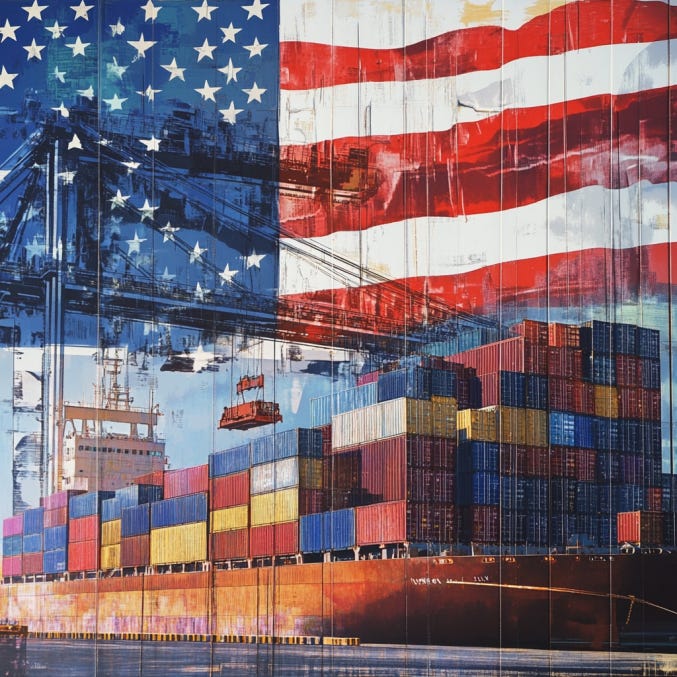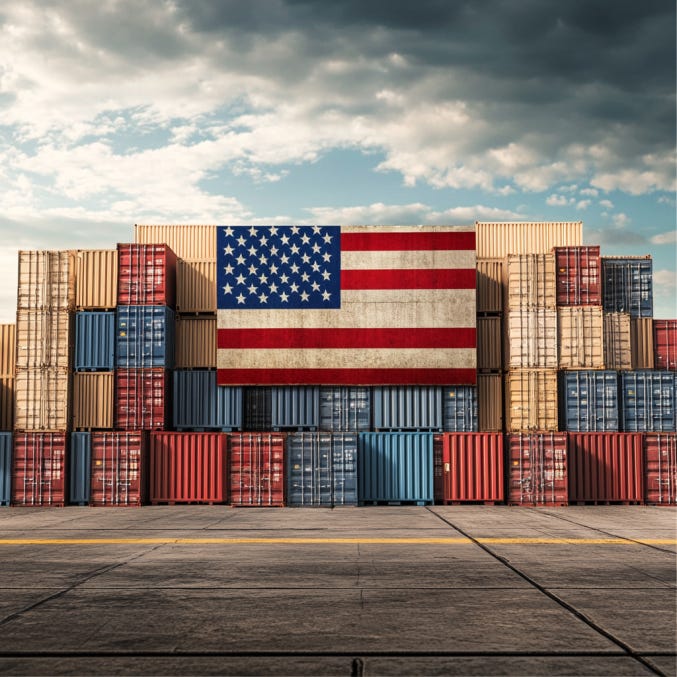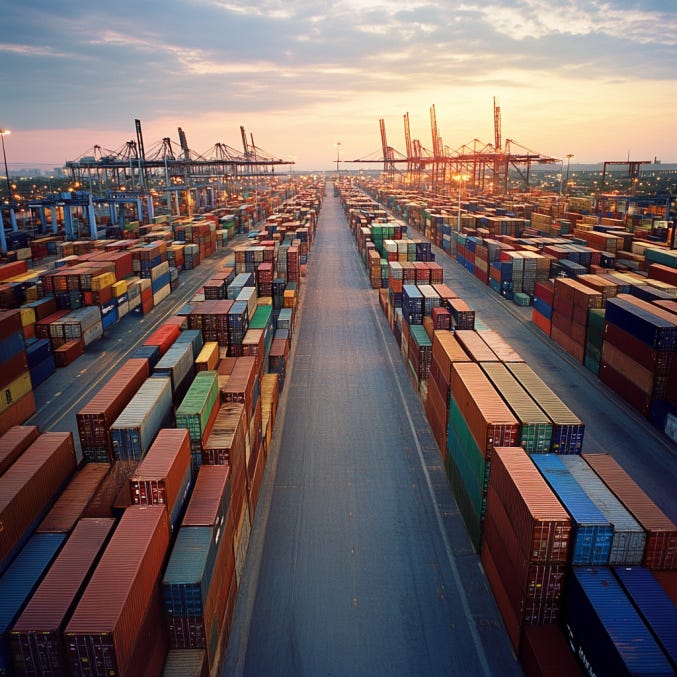Economists Hate Trump's Tariffs - Yet Mostly Okay with Biden's (Hypocrisy 101)
If tariffs hurt the country imposing them, then why do countries retaliate with tariffs - thereby hurting themselves? Woke economists just keep screaming inflation.
Economists are correct… tariffs are usually inflationary for the country imposing them. However, what most fail to discuss:
Tariffs can be used strategically and/or in a targeted way as leverage to renegotiate unfair trade deals.
If tariffs mostly hurt the country imposing them (others wouldn’t retaliate with tariffs of their own - they’d instead be thankful for them).
When Trump entered office, the left-wing mob was in hysterics about tariffs… yet funny enough they omitted the fact that Joe Biden: (1) mostly maintained Trumps tariffs from 2018 on Chinese goods AND (2) introduced more tariffs on $18B worth of Chinese goods (increasing EV tariffs from 25% to 100%, solar sells & semiconductors from 25% to 50%, and more).
I’m not necessarily knocking Biden here. He was put in this position by Trump 1.0 and what he/his admin did was probably the smart thing… ending the trade war puts China in a more advantageous position. Whether Biden would’ve imposed tariffs if there were none from Trump 1.0 is unclear.
But the fact is, the Democrats were appalled by the fact that Trump introduced tariffs in 2018 and planned more for 2025… most don’t even have knowledge of the tariffs Biden imposed. Just partisan hypocrisy.
RELATED: Trump’s 2018 Tariffs: Economists’ Predictions vs. Reality
RELATED: Trump’s 2025 Tariff Proposals: Canada, Mexico, EU, China
Recent Tariffs vs. Reality in the U.S. (2025)
Economists are correct in that tariffs generally cause short-term and/or medium-term pain via inflation - not debating that… but they never think beyond this due to their fixation on the short-term economy.
Obviously bankers, investors, etc. can’t stomach the thought of taking on some economic pain for months, years, etc. to make the country stronger long-term - so you’ll see them in the media coming out strongly against tariffs. (Ideally it wouldn’t come to this, but if other countries are unwilling to trade fairly and expect U.S. to contribute more - they should face consequences).
It’s possible that suffering through some short-term and/or medium-term pain of inflation could yield significant long-term gains if: (1) countries ripping off the U.S. capitulate for fairer trade deals (hurting them more than U.S.) and/or (2) the U.S. builds up its domestic capabilities (decreasing reliance on global markets).
Most of the tariffs aimed at trade partners: EU, UK, Canada, Mexico, etc. hurt them far more than they hurt the U.S. Yes they’ll cause pain for both countries, but they lay the smackdown on them harder - possibly leading them to rethink aspects of socialism.
Most of these countries would NOT be able to maintain the same level of socialism without exploiting the U.S. via unfair trade.
Something to think about: Why do other countries retaliate with tariffs of their own when the U.S. imposes tariffs on them? If tariffs mostly hurt the country imposing them (like mainstream economists infer), shouldn’t they be thanking the U.S. and begging for more?
Most claim they do it as an image thing not to look weak… but why would it look weak if your country is benefitting more (from passing higher costs on to Americans)?
The reality is that many jobs would leave these countries and the U.S. would eventually overtake them because their socialist policies are anti-growth… they’d lose 10/10 times without massively retooling their economic system.
Would a tariff or trade war actually prove effective for the U.S. in the long-term?
Really unknown. I’m not claiming it’ll work for various reasons: (1) high pressure on politicians (if highly inflationary… money talks loudly); (2) other countries may retaliate/drag things out; (3) it takes a while to build-out domestic industry in the U.S. (if we need to go full homegrown); (4) other countries may eventually work out a fair deal (but timeline unknown: months, years, etc.).
Conventional Economist Wisdom: “Tariffs Are Bad for the Imposing Country”
Economists worldwide love to proclaim that tariffs are inflationary and almost always harm the country that imposes them. On the face of it, that claim is not incorrect:
Tariffs can raise consumer prices, since imported goods become more expensive.
Costs ripple through supply chains, leading to inflationary pressures.
Short-term pain can be significant—industries and consumers might see higher prices on necessities.
Fine. Let’s accept that at face value: yes, there is short-term or even medium-term economic pain. But the conversation rarely goes further.
Economists tend to stop there, ignoring strategic or geopolitical implications. They gloss over how tariffs can be used as diplomatic leverage to correct entrenched unfairness in trade deals.
And this is where the glaring hypocrisy emerges—especially when we see how the same parties that railed against Trump’s tariffs have quietly maintained or even expanded them under Biden.
The “Hypocrisy” Exposed
1. Democrats Denouncing Trump, Then Doubling Down
When President Trump imposed tariffs on Chinese goods in 2018, many on the left treated it as if the sky were falling. We heard nonstop rants on CNN or in op-eds about how “Trump is causing a trade war” and “tariffs will destroy our economy.”
Yet, fast forward to the Biden administration: Biden not only kept most of Trump’s China tariffs in place but actually increased them on a variety of items (e.g., EV components from 25% to 100%, solar cells, semiconductors).
The left (by and large) went silent. Where was the outrage? The doomsday talk? The moral posturing about harming global trade?
This double standard is transparent partisanship. There was no mass condemnation of “Biden’s destructive tariffs”—almost as if the same policy magically changed its complexion once a different person occupied the Oval Office.
2. Economists’ One-Track Mind
Economists who trashed Trump’s tariffs haven’t made nearly the same fuss over Biden’s increases. The reason is simple: many are captive to the short-term pain argument and rarely ask whether there’s a long-term strategic win.
They also fail to stress that if tariffs truly only hurt the imposing country, other nations would be thrilled. But in reality, foreign governments retaliate, which shows that tariffs can (and do) hurt them as well, not just the U.S.
3. The “Tariffs Help the Other Guy” Myth
Conventional wisdom says, “If your country slaps tariffs on imports, you’ll only harm yourself, so it’s a gift to your trade partners.” If that were actually the case, other countries should be applauding or at least quietly enjoying the U.S.’s self-inflicted pain.
In reality, they retaliate: The EU, China, Mexico, and Canada all introduced tariffs on U.S. goods after Trump’s moves. Retaliation wouldn’t make sense if they truly believed the U.S. was only hurting itself.
Their reaction indicates they are being squeezed. Higher tariffs threaten their industries, potentially trigger job losses, and push them into making more concessions or negotiations. They may posture that their retaliation is purely “to save face,” but the real fear is that American industries could ultimately become more self-sufficient and erode their market share.
Strategic Case for Tariffs by the United States
While there’s no guarantee tariffs always pan out, the short-term pain of price increases might be worth it if there’s a viable long-term reward. For example:
Renegotiating Unfair Deals
If certain trade partners exploit lax regulations, manipulate currency, or rely on forced technology transfers (all accusations leveraged at China), using tariffs can be a blunt but sometimes effective cudgel to bring them back to the bargaining table.
The argument is that if you don’t push back, you can get stuck with a raw deal that erodes U.S. competitiveness.
Building Domestic Capabilities
Over-reliance on global supply chains has left the U.S. vulnerable in areas like semiconductors, pharmaceuticals, and critical technology.
By imposing tariffs, it becomes more viable to invest in the U.S. supply chain (e.g., encouraging manufacturing to stay or return onshore). Yes, it’s not painless; setting up domestic production requires capital, workforce training, and time. But the payoff could be greater resiliency and less dependence on hostile or unreliable partners.
Leveraging the U.S. Consumer Market
Everyone wants access to the American consumer. The U.S. remains one of the largest, wealthiest markets on Earth.
That market access is a huge bargaining chip. If used judiciously, tariffs can force global players to make concessions or to accept more equitable terms (like better IP protection or equal market access for American companies abroad).
Short-Term vs. Long-Term Thinking
A central criticism of economists is that they often revolve around short-term disruptions (price spikes, inflation, immediate job losses in some sectors) rather than playing the multi-year or even multi-decade chess game of realigning supply chains and forging balanced trade.
Meanwhile, bankers and investors hate uncertainty. Their bottom lines can’t handle volatility on monthly or quarterly earnings. That’s what’s driving much of the anti-tariff media narrative—not necessarily what’s best for the country in 5, 10, or 20 years.
The U.S. Allows Unfair Trade Deals
One of the most provocative points is that the U.S. subsidizes other countries’ by:
Opening our markets widely;
Allowing lopsided trade arrangements; and
Tolerating barriers or manipulations (currency manipulation, state support of key industries, etc.).
In many ways, the U.S. consumer’s willingness to buy foreign goods—and our government’s passivity in responding to trade barriers—acts as a bankroll for countries whose internal policies might otherwise be unsustainable.
If the U.S. suddenly becomes more self-sufficient, produces at home, or negotiates more stringent terms, those foreign countries might no longer afford certain social benefits.
Is that true for every nation? Maybe not. But for countries that rely heavily on exports to American consumers—and then funnel that revenue back into their social programs—it’s a hard reality.
That’s precisely why they’re so vehemently opposed to America using the “tariff bomb.” They fear a major revenue stream will dry up or at least face cost-raising hurdles.
Can Tariffs Work? The Uncertainties
Political Pressure
Tariffs risk inflation, and politicians loathe voter anger over price spikes. That’s a big reason efforts often stall.
If an administration tries to hold firm, corporate lobbyists, bankers, and big retailers start screaming. Politicians have to weigh re-election campaigns versus the potential long-term advantages of playing hardball.
Other Countries Might Not Blink
Nations like China or blocs like the EU may decide they’d rather endure economic pain than concede. This leads to a long standoff, which can backfire if the U.S. can’t tolerate the short-term pain.
Time Needed for Domestic Industry to Grow
Building a robust manufacturing sector doesn’t happen overnight. Even if tariffs exist, you need infrastructure, skilled labor, and supply chains in place. That’s a multi-year process—frustrating to politicians who want immediate wins.
Negotiation Timelines
Maybe the tariff threat works and, in a matter of months, a better deal emerges. Or it could take years, and public/political patience might run out well before an agreement is reached.
Partisan Posturing vs. Reality
It’s not about whether you personally love Trump or Biden; it’s about noting the inconsistent condemnation.
Trump introduced tariffs → The left and many economists cried foul: “Trade wars are bad!”
Biden keeps/increases tariffs → The left goes quiet. Economists issue scattered protests, but the mainstream coverage pales in comparison.
The average voter might not even realize Biden has ramped up certain tariffs; it’s seldom a headline topic. It’s a glaring instance of how selectively outraged the media and politicians can be when it suits their partisan narrative.
If tariffs are truly the ultimate evil, then why is it that Biden’s policy stance on tariffs has been so similar—and in some cases even more aggressive—than Trump’s, with relatively little pushback from the usual critics?
Bottom Line re: U.S. Tariffs (Trump 2025)
Tariffs undeniably inflict economic pain. They can be inflationary, unpopular, and disruptive to supply chains. However, this knee-jerk condemnation and partisan game obscures a more nuanced reality:
Short-term pain could lead to long-term gain if used as leverage to correct massive trade imbalances or renegotiate archaic, lopsided deals.
If tariffs truly only harmed the U.S., why do other countries retaliate so aggressively?
Biden’s quiet continuation (and expansion) of Trump-era tariffs casts a harsh light on the hypocrisy of those who screamed about “trade wars” under one administration but tolerated them under another.
A real debate should address not just inflation’s immediate impact but long-term strategic independence, industrial policy, and how to confront foreign trade abuses.
Do tariffs always work as intended? Clearly not always. There are many variables—political, economic, and global that influence their efficacy.
But dismissing them outright, or failing to even discuss their potential strategic upsides, is intellectual laziness at best, and partisan hypocrisy at worst.
If they’re the wrong tool, critics need to show a better one (with evidence that it actually works)—and not just condemn them out of reflex or political expediency.






